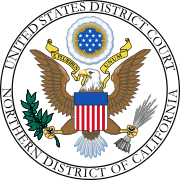Oracle Corp. v. SAP AG
| Oracle Corporation v. SAP AG | |
|---|---|
 | |
| Court | United States District Court for the Northern District of California |
| Full case name | Oracle Corp., et al v. SAP AG |
| Decided | September 1, 2011 |
| Court membership | |
| Judge sitting | Magistrate Judge Edward M. Chen |
| Keywords | |
| Copyright infringement | |
Oracle Corp v. SAP AG, 07-01658, is a United States District Court for the Northern District of California case in which Oracle sued SAP, alleging that SAP had engaged in copyright infringement by downloading thousands of copyrighted documents and programs from Oracle's Customer Connection website. SAP admitted that its subsidiary TomorrowNow had infringed Oracle's copyrights and a jury awarded Oracle record-high damages in the amount of $1.3 billion. The judge later vacated the jury's verdict, which was based on the calculation of a hypothetical license, and granted SAP's motion for a new trial dependent on Oracle rejecting a remittitur of $272 million.
Background
TomorrowNow was a company based in Bryan, Texas, which specialized in offering third-party technical service and support for enterprise software systems, including systems from PeopleSoft and JD Edwards. TomorrowNow was acquired by SAP AG in 2005 and became a wholly owned subsidiary of SAP.[1]
PeopleSoft acquired JD Edwards in 2003[2] and then Oracle Corporation acquired PeopleSoft in 2005.[3]
On March 22, 2007, Oracle filed a complaint with the United States District Court for the Northern District of California accusing SAP and TomorrowNow of corporate theft on a "grand scale".[4][5] According to Oracle, TomorrowNow had downloaded thousands of documents and programs from Oracle's Customer Connection technical support website. Downloads were performed using credentials from Oracle customers whose support contract either already had or were about to expire. In addition, TomorrowNow had downloaded copyrighted support material for which the customers did not hold a license, and thus, were not authorized to access.[4]
Initially, SAP admitted that TomorrowNow had accessed Oracle's software and support documentation using customers' credentials, but claimed they were entitled to do so as TomorrowNow had been contracted by those customers to provide third-party support for their Oracle products.[6] Later, Oracle and SAP agreed to limit the scope of the trial to solely the copyright infringement claim and the damages.[7] SAP offered to admit that TomorrowNow had indeed infringed Oracle's copyrights, leaving the court to determine the damages amount.[8]
On the issue of damages, the two parties presented calculations that were vastly different. SAP claimed that Oracle had not suffered any losses and SAP/TomorrowNow had gained no financial benefit (rather they had lost $90 million) from the infringement. According to SAP's calculation, the damages were between $28 million and $408.7 million.[9] Oracle based their damages calculation on the hypothetical price it would have cost a customer to purchase all the software and support in order to legally access all the material downloaded by TomorrowNow, totaling $2 billion.[10]
Court ruling
On November 23, 2010, the jury awarded Oracle damages in the amount of $1.3 billion.[11] This was the highest amount of damages ever awarded in a copyright infringement case.[12] The jury verdict was later (September 1, 2011) reversed by U.S. District Judge Phyllis Hamilton. In her ruling Judge Hamilton stated:
"Oracle’s suggestion – that upon proof of infringement, copyright plaintiffs are automatically entitled to seek “hypothetical” license damages because they are presumed to have suffered harm in the form of lost license fees – has no support in the law."[13]
SAP's motion for a new trial was granted, upon Oracle rejecting a remittitur of $272 million.[13] Which was based on the "maximum amount of lost profits and infringer’s profits sustainable by the proof." [13]
Judge Hamilton further stated:
"Determining a hypothetical license price requires an “objective, not a subjective” analysis, and “[e]xcessively speculative” claims must be rejected."[13]
References
- ^ Kane, Margaret. "SAP buys PeopleSoft support firm". CNET. Retrieved 14 October 2011.
- ^ Regan, Keith. "PeopleSoft Buys J.D. Edwards for $1.7B". E-Commerce Times. Retrieved 14 October 2011.
- ^ Kerstetter, Jim. "Finally, Oracle Nails PeopleSoft". Bloomberg Businessweek. Retrieved 14 October 2011.
- ^ a b "Complaint and demand for damages and injunctive relief" (PDF). The initial complaint filed by Oracle. Retrieved 14 October 2011.
- ^ Jones, Ashby. "Oracle Sues SAP Alleging "Corporate Theft on a Grand Scale"". Wall Street Journal. Retrieved 14 October 2011.
- ^ "Defendants answer and affirmative defenses to first amended complaint" (PDF). SAP response to Oracle's complaint. Retrieved 14 October 2011.
- ^ Niccolai, James. "Oracle vs SAP lawsuit: 27 most popular questions about the TomorrowNow case". ComputerWorld UK.
- ^ Niccolai, James. "Update: Oracle-SAP case takes dramatic 11th-hour turn". Computerworld. Retrieved 17 October 2011.
- ^ Gullo, Karen. "Oracle's $1.3 Billion U.S. Verdict Against SAP Thrown Out". Bloomberg. Retrieved 17 October 2011.
- ^ Niccolai, James. "Oracle License Would Have Cost SAP Billions, Phillips Says". PC World. Retrieved 17 October 2011.
- ^ "Special verdict form" (PDF). Jury verdict on amount of damages. Retrieved 14 October 2011.
- ^ Gullo, Karen. "Oracle Wins $1.3 Billion Verdict for Closed SAP Unit's Illegal Downloading". Bloomberg. Retrieved 17 October 2011.
- ^ a b c d HAMILTON, PHYLLIS J. "Order partially vacating judgement" (PDF). Judge reverses the amount of damages awarded by the jury and offers remittitur or new trial. Retrieved 14 October 2011.
